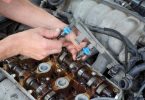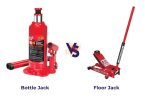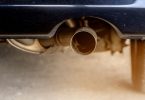When you apply more force to the accelerator, your car usually accelerates and increases its speed. Drivers usually know how much force to exert in order to reach their desired speed. However, there are instances when a car feels slow to respond during acceleration due to various underlying issues. These issues can be related to emissions or problems with the fuel system.
Experiencing sluggish acceleration in your car can pose risks, especially when overtaking other vehicles, navigating intersections, or driving uphill. Therefore, it is crucial to promptly address any problems with a car’s acceleration by seeking immediate repairs.
There are several common causes that can contribute to a car feeling sluggish when accelerating. These include a dirty and failing mass air flow sensor (MAF sensor), a clogged air filter, a faulty throttle position sensor, a bad O2 sensor, a clogged catalytic converter, a bad EGR valve, faulty spark plugs, and issues with the fuel system.
Why Your Car Feels Sluggish When Accelerating

1) Clogged or Dirty Air Filter
The primary cause for a car feeling sluggish during acceleration is often clogged air filters, which restrict the airflow. This directly affects the engine’s performance by increasing the consumption of fuel. In severe cases, heavily clogged air filters can even lead to engine stalling. Therefore, it is crucial to inspect and replace the air filters as necessary.
You can easily replace your air filter without any specialized skills. So, look into this factor if your car is slow to accelerate.
2) Bad MAF Sensor
The MAF sensor of your vehicle plays a vital role in the fuel injection system. Positioned between the throttle valve and the air filter box, the MAF sensor ensures the appropriate mixture of air and fuel in the engine’s combustion chamber.
Over time, the MAF sensor can become defective or dirty, leading to inaccuracies in the data transmitted to the car’s internal system. As a result, there could be an error in determining the precise amount of fuel being supplied to the combustion system. It is possible to clean an MAF sensor using a sensor-specific MAF cleaner, but a faulty sensor should be replaced promptly.
3) Fouled Spark Plugs
Spark plugs are responsible for creating the ignition needed to turn on the engine. If a spark plug is faulty, it can lead to performance loss with increased fuel consumption.
Faulty spark plugs can cause car misfires and result in poor acceleration. Due to the potential risks associated with driving with bad spark plugs, it is essential to prioritize their replacement.
4) Bad Oxygen Sensor
Oxygen sensors come in different types but all serve the common purpose of regulating the air-to-fuel ratio through measuring oxygen levels. When these sensors become damaged, the engine’s ability to maintain a proper air and fuel ratio is compromised. As a result, the car may feel sluggish during acceleration, exhibit rough idling, or lose its power.
Additionally, a dirty oxygen sensor can also contribute to poor acceleration. If that’s the case, clean the oxygen sensor properly.
5) Faulty Throttle Position Sensor
This sensor is responsible for monitoring the fuel intake of a car’s engine. It achieves this by identifying the angle at which the throttle valve opens and then by relaying this information to the car’s control unit.
When the TPS malfunctions, it often leads to issues with car acceleration. In such cases, you won’t be able to control the speed effectively through the accelerator pedal.
6) Clogged Catalytic Converter
The catalytic converter plays a crucial role in the exhaust system of a car that has an internal combustion engine. It converts toxic gases into less harmful substances using catalysts.
If the catalytic converter becomes clogged or fails, the car may release hazardous gases and produce black smoke. In fact, this is one of the most common cause of acceleration issues when pressing the accelerator pedal.
7) Faulty Fuel System
For the combustion process to occur effectively, the engine depends on a properly functioning fuel system that delivers the required amount of fuel. If the fuel system experiences malfunctions, it can result in inadequate fuel delivery to the engine and lead to problems with acceleration.
8) Damaged Vacuum Hose
A broken or disconnected vacuum hose can allow excess air to enter the engine, disrupting the required air-fuel ratio. This disruption can cause engine misfires and sluggish acceleration. Additionally, such a defect can also impact the brake booster, leading to a stiffer brake pedal sensation.
9) Exhaust System Issues
Exhaust system issues, like a bad catalytic converter, may make your car sluggish.
- If the catalytic converter becomes clogged, it can disrupt the engine cycle, leading to inefficient combustion and a sluggish response when accelerating.
- Accumulated carbon on the exhaust recirculation valve can hinder proper closure, potentially causing an excessive supply of exhaust gases to the engine. This can result in engine misfires and decreased acceleration.
- When the EVAP purge valve remains stuck in an open position, it can create a vacuum leak that allows excess air to enter the engine. This can result in a lean fuel-to-air mixture, engine misfires, and hindered acceleration.
10) Bad Timing Belt
If the timing belt slips or is improperly fitted, it can cause the engine’s valves to open or close at incorrect times. As a consequence, engine misfiring can occur, leading to reduced acceleration performance.










Leave a Comment